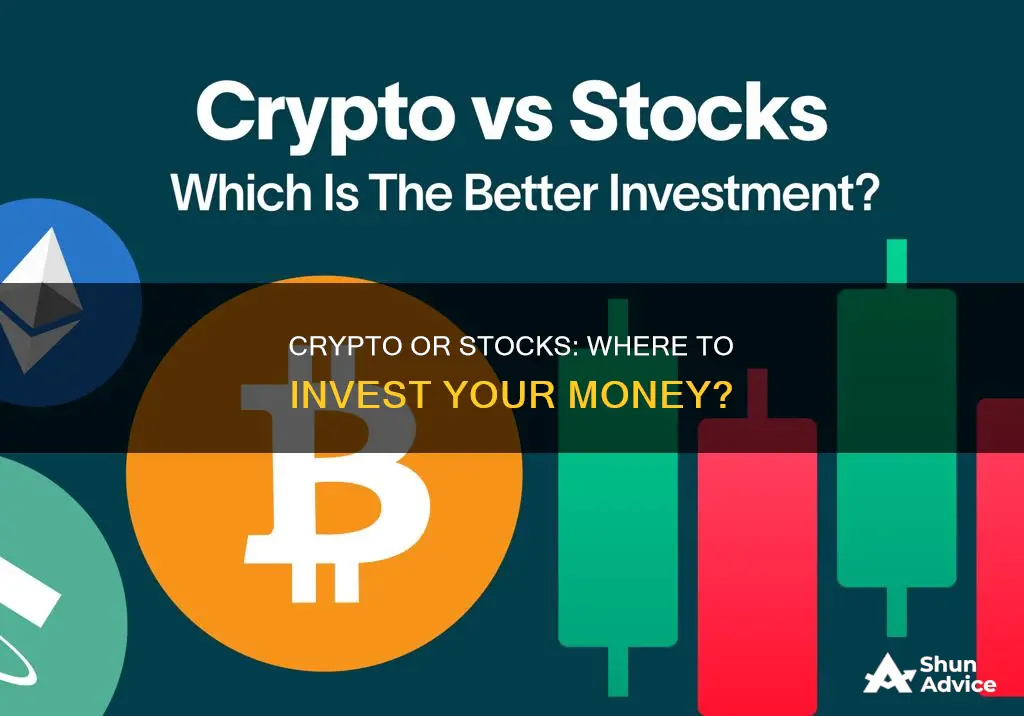
The choice between investing in crypto or stocks depends on an individual's risk appetite, financial goals, and understanding of each asset class. Stocks are considered more stable and secure, as they are tied to the financial performance of a company, while cryptocurrencies are highly volatile and subject to constant price fluctuations driven by market speculation. Stocks are also highly regulated and operate through established exchanges, while the cryptocurrency market has varied global regulation and is more decentralised, which can pose a greater risk of fraud or manipulation. On the other hand, cryptocurrencies offer the allure of high returns and constant market access, and they are also a rapidly evolving digital asset class. Therefore, investors need to carefully weigh the pros and cons of each asset class before making an informed decision.
| Characteristics | Values |
|---|---|
| Ownership | Stocks represent fractional ownership of a company, while cryptocurrencies are digital or virtual currencies. |
| Backing | Stocks are backed by a company's assets and cash flow, while cryptocurrencies are not backed by anything. |
| Regulation | Stocks are highly regulated and operate through established exchanges, while cryptocurrencies have varied global regulation. |
| Trading Hours | Stocks are traded during specific hours, while crypto markets are accessible 24/7. |
| Dividends | Stocks may offer dividends, while cryptocurrencies do not. |
| Volatility | Cryptocurrencies are highly volatile, while stocks are generally less volatile. |
| Risk | Cryptocurrencies offer higher potential returns but also come with higher risk. Stocks are considered safer but are not immune to risk. |
| Accessibility | Stocks are more accessible to investors with many online brokers offering zero trading fees. Crypto brokers typically charge trading fees. |
| Innovation | Cryptocurrencies offer exposure to the latest technological innovations, while stocks are tied to more established companies. |
What You'll Learn
- Crypto vs Stocks Value: Stocks represent ownership of a business, while the value of crypto comes down to supply and demand
- Crypto vs Stocks Governance: Stocks have a long history of regulation, while crypto has no regulatory framework
- Trading Crypto vs Stocks: Crypto brokers often charge trading fees, while most stock brokers do not
- Crypto Advantages vs Stocks: Crypto coins can skyrocket as their valuation isn't held back by financial results
- Crypto Disadvantages vs Stocks: The lack of regulation adds risk to the crypto market, and many investors will stay away as a result

Crypto vs Stocks Value: Stocks represent ownership of a business, while the value of crypto comes down to supply and demand
When deciding whether to invest in crypto or stocks, it's important to understand the fundamental differences between these assets. Stocks represent fractional ownership of a company, giving shareholders a claim to the company's assets and cash flow. This provides an intrinsic value to stocks, which is backed by the company's ability to generate profits over the long term.
On the other hand, cryptocurrencies are digital or virtual currencies that use cryptography for security. Unlike stocks, the value of crypto is not tied to the financial performance of a company. Instead, the value of crypto comes down to supply and demand dynamics in the market. Cryptocurrencies have no intrinsic value and are highly volatile, with prices fluctuating based on speculative trading and investor sentiment.
The lack of intrinsic value in cryptocurrencies means that their value is driven purely by market forces. Crypto prices surge when demand exceeds the limited supply, and this demand can be influenced by various factors such as increased visibility on exchanges, broader adoption, and the launch of new decentralised finance projects. Additionally, as mining becomes more competitive and production costs rise, the value of crypto can increase.
While stocks are highly regulated and traded on established exchanges, the crypto market has a less standardised regulatory framework, with some countries banning cryptocurrencies outright. This lack of regulation can make crypto a riskier investment, but it also offers increased privacy and freedom compared to stocks.
In summary, stocks provide a sense of security with regulatory oversight, potential dividends, and an established market presence. Cryptocurrencies, on the other hand, offer the allure of high returns, constant market access, and exposure to technological innovations. The choice between investing in crypto or stocks depends on an individual's risk tolerance, financial goals, and understanding of each asset class.
The Best Time to Invest in Bitcoin
You may want to see also

Crypto vs Stocks Governance: Stocks have a long history of regulation, while crypto has no regulatory framework
The stock market has been around for centuries and is heavily regulated by governments worldwide. In contrast, the crypto market is a relatively new concept with no centralised regulatory framework.
The stock market has a long history of regulation, with rules governing how stocks are traded, owned, and managed. This includes strict requirements for companies to disclose accurate financial information. Stockbrokers are also heavily regulated and required to provide certain information to investors. As a result, stocks are considered less risky than cryptocurrencies, although they are still subject to market volatility and business decisions.
On the other hand, the crypto market operates outside the control of central banks and is not subject to international laws and regulations. The lack of standardised global regulation means cryptocurrencies may offer increased privacy and freedom but also harbour a greater risk of fraud or manipulation. The regulatory future of cryptocurrencies is uncertain, and many investors are hesitant to enter the market until clear rules are established.
While the stock market operates through established exchanges with set opening hours, the crypto market is decentralised and accessible 24/7. Crypto transactions are also anonymous and not tied to economic trends such as inflation.
In summary, stocks have a long history of regulation and investor protections, while the crypto market is relatively new and lacks a centralised regulatory framework. This makes stocks a more established and less risky investment option compared to cryptocurrencies.
KDA Coin: A Smart Investment Move?
You may want to see also

Trading Crypto vs Stocks: Crypto brokers often charge trading fees, while most stock brokers do not
When it comes to trading fees, there are some key differences between crypto and stocks. Crypto brokers often charge trading fees for each transaction, whereas most stock brokers ended this practice in 2018 and 2019. For example, popular crypto exchange Coinbase charges a transaction fee of 0.6% on crypto purchases of less than $10,000. In contrast, stock trades can be performed very quickly, and most stock brokers do not charge any trading fees.
However, it is important to note that there are still some costs associated with stock trading. While stock brokers may not charge explicit trading fees, they can make money in other ways, such as by routing orders to market makers in exchange for transaction rebates. Additionally, stock trades may be executed at slightly inflated or deflated prices, resulting in a small difference between the effective transaction price and the current market quote.
On the other hand, cryptocurrency transaction fees are typically charged at multiple levels, including by the crypto exchange, the blockchain network, and the digital wallet service. These fees support blockchain functions, prevent spam, and aid in platform development. While crypto transaction fees are generally small, they can surge during periods of high network activity. For example, Ethereum's gas fees spiked to thousands of dollars per transaction in May 2022 due to high demand for a series of Ethereum-based non-fungible tokens (NFTs).
Overall, when considering the fees associated with trading crypto or stocks, it is important to look at the full picture. While crypto brokers may charge explicit trading fees, stock brokers can have other ways of generating revenue that may ultimately result in similar or even higher costs for traders.
Bitcoin Diamond: Smart Investment or Risky Gamble?
You may want to see also

Crypto Advantages vs Stocks: Crypto coins can skyrocket as their valuation isn't held back by financial results
Crypto coins can skyrocket in value, and there are several reasons why an investor might choose to invest in them over stocks.
Firstly, cryptocurrencies are decentralised and controlled by their users, rather than by central banks or governments. This means that their supply is limited, unlike fiat currencies, and they are theoretically immune to government interference or manipulation. This makes them a potential hedge against inflation caused by central banks printing money.
Secondly, cryptocurrencies have lower barriers to entry than stocks. While investing in stocks often requires access to a stockbroker and substantial sums of money, crypto exchange platforms have made it easy to start trading crypto with small amounts of money.
Thirdly, cryptocurrencies have the potential for outsized gains. Several cryptocurrencies have seen their prices skyrocket since being introduced, and a small allocation of crypto in your portfolio could pay off enormously if its value increases significantly.
Finally, cryptocurrencies are becoming increasingly accepted and adopted. Financial giants like Block, PayPal and Tesla have made it easier to buy and sell crypto on their platforms, and El Salvador even adopted Bitcoin as legal tender in 2021.
However, it is important to remember that cryptocurrencies are extremely volatile and lack the intrinsic value of stocks, which are backed by the assets and earnings of the companies that issue them. The value of a stock over time depends on the success of the underlying company, whereas the value of a cryptocurrency is purely speculative, based on whether or not people want to buy it.
Additionally, cryptocurrencies are susceptible to cybersecurity risks and regulatory changes, and their lack of a complete regulatory framework adds an element of uncertainty.
Therefore, while crypto coins can offer the potential for huge gains, they also carry significant risks. Investors should carefully consider their financial situation, risk tolerance and goals before deciding whether to invest in crypto or stocks.
Steem Cryptocurrency: A Guide to Investing and Profiting
You may want to see also

Crypto Disadvantages vs Stocks: The lack of regulation adds risk to the crypto market, and many investors will stay away as a result
The cryptocurrency market has been described as the Wild West, with a lack of regulation that adds an uncomfortable amount of risk. While some countries have recognised cryptos as legal property, the market is still largely unregulated. The US, for example, treats crypto as property for tax purposes, but there is no federal legislation in place.
The regulatory future for cryptocurrencies is uncertain, and many investors will not enter the market until there is a clear rulebook in place. Institutional investors are particularly wary of the fledgling market. They want to know how the government will tax the gains and address fraud before they get involved.
The lack of regulation has other consequences, too. For example, there is no recourse for investors who lose their crypto assets due to theft or fraud. There are also concerns about the environmental impact of crypto mining, with some countries banning the practice altogether.
The anonymity of crypto transactions is also a double-edged sword. While privacy is a plus, it also means that crypto can be used for criminal activities such as money laundering and tax evasion.
Until there is more regulatory clarity, the crypto market will remain a risky prospect for many investors.
My Bitcoin Loss: A Costly Lesson Learned
You may want to see also
Frequently asked questions
Stocks represent ownership in a company, while cryptocurrencies are digital or virtual currencies that use cryptography for security. Stocks are highly regulated and tied to financial reports, while cryptocurrencies are less regulated and driven by market speculation and demand-supply dynamics.
The pros of investing in crypto include the potential for outsized gains, a growing number of coins, and wide interest from investors, companies, and governments. On the other hand, the cons include extreme volatility, cybersecurity risks, no intrinsic value, and regulatory risks.
The pros of investing in stocks include a long history of solid returns, intrinsic value, accessibility, and stronger regulation. Meanwhile, the cons include volatility, lower potential for extreme gains, and the need for a long-term investment plan.
You can buy cryptocurrency using a crypto exchange or through certain broker-dealers. Popular exchanges include Coinbase and Binance. You can also invest in crypto-focused funds or companies, or even set up a crypto Roth IRA.
You can invest in stocks through online brokers, which often offer low or no trading fees. You can invest in individual stocks or choose to purchase a diversified basket of stocks through an index fund.







